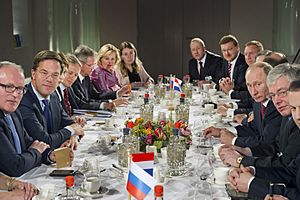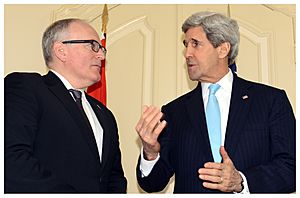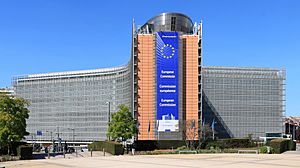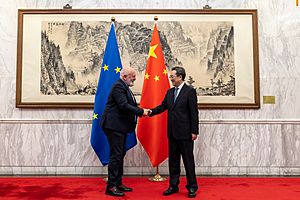Frans Timmermans facts for kids
Quick facts for kids
Frans Timmermans
|
|||||||||||||
|---|---|---|---|---|---|---|---|---|---|---|---|---|---|
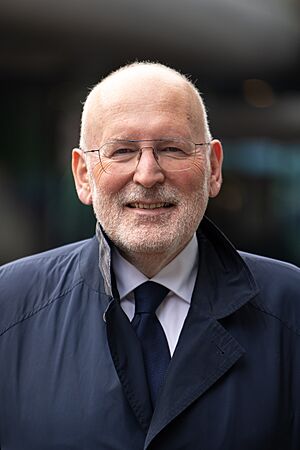
Timmermans in 2025
|
|||||||||||||
| Executive Vice President of the European Commission for the European Green Deal | |||||||||||||
| In office 1 December 2019 – 22 August 2023 |
|||||||||||||
| Commission | Von der Leyen I | ||||||||||||
| Preceded by | Position established | ||||||||||||
| Succeeded by | Maroš Šefčovič | ||||||||||||
| European Commissioner for Climate Action | |||||||||||||
| In office 1 December 2019 – 22 August 2023 |
|||||||||||||
| Commission | Von der Leyen I | ||||||||||||
| Preceded by | Miguel Arias Cañete | ||||||||||||
| Succeeded by | Maroš Šefčovič (acting) | ||||||||||||
| First Vice President of the European Commission | |||||||||||||
| In office 1 November 2014 – 30 November 2019 |
|||||||||||||
| Commission | Juncker | ||||||||||||
| Preceded by | Catherine Ashton | ||||||||||||
| Succeeded by | Position abolished | ||||||||||||
| Minister of Foreign Affairs | |||||||||||||
| In office 5 November 2012 – 17 October 2014 |
|||||||||||||
| Prime Minister | Mark Rutte | ||||||||||||
| Preceded by | Uri Rosenthal | ||||||||||||
| Succeeded by | Bert Koenders | ||||||||||||
| State Secretary for European Affairs | |||||||||||||
| In office 22 February 2007 – 23 February 2010 |
|||||||||||||
| Prime Minister | Jan Peter Balkenende | ||||||||||||
| Preceded by | Atzo Nicolaï | ||||||||||||
| Succeeded by | Ben Knapen | ||||||||||||
| Member of the House of Representatives | |||||||||||||
| Assumed office 6 December 2023 |
|||||||||||||
| In office 9 June 2010 – 5 November 2012 |
|||||||||||||
| In office 6 May 1998 – 22 February 2007 |
|||||||||||||
|
|||||||||||||
| Personal details | |||||||||||||
| Born |
Franciscus Cornelis Gerardus Maria Timmermans
6 May 1961 Maastricht, Netherlands |
||||||||||||
| Political party | Labour (since 1990) | ||||||||||||
| Other political affiliations |
Democrats 66 (1985) | ||||||||||||
| Spouse |
Irene Timmermans
(m. 2000) |
||||||||||||
| Children | 4 | ||||||||||||
| Education | Radboud University (BA, MA) Nancy 2 University (LLM, MA) |
||||||||||||
| Signature | |||||||||||||
| Military service | |||||||||||||
| Allegiance | |||||||||||||
| Branch/service | |||||||||||||
| Years of service | 1986–1987 | ||||||||||||
| Unit | |||||||||||||
Frans Timmermans (born 6 May 1961) is a Dutch politician. He was the leader of the GreenLeft-Labour Party (GroenLinks-PvdA) in the Dutch Parliament from 2023 until his resignation in October 2025.
Before this, Timmermans held important roles in the European Commission, which is like the government of the European Union. From 2019 to 2023, he was an Executive Vice President, focusing on the European Green Deal. This plan aims to make Europe climate-neutral. He also served as the European Commissioner for Climate Action. Before that, from 2014 to 2019, he was the First Vice-President of the European Commission. In this role, he worked on making rules better, improving relations between different parts of the EU, and upholding basic rights.
Before his work in Europe, Timmermans was the Dutch Minister of Foreign Affairs from 2012 to 2014. He also served as the State Secretary for European Affairs from 2007 to 2010. He was a member of the Dutch Parliament for the Labour Party at different times between 1998 and 2012. Earlier in his career, he worked as a diplomat for the Netherlands.
In 2023, Timmermans left the European Commission to lead the joint GroenLinks–PvdA alliance in the Dutch general election. This alliance became the second-largest group in parliament. He served as its leader in the House of Representatives. After the 2025 parliamentary election, Timmermans announced his resignation as leader of the alliance.
Contents
- Early Life and Education
- Diplomatic Career
- Political Career
- Personal Life
- Honours and Decorations
- See also
Early Life and Education
Frans Timmermans was born on 6 May 1961 in Maastricht, a city in the Netherlands. He grew up in a Roman Catholic family. During his childhood, his parents divorced. His father, who worked as a security officer for the Dutch foreign ministry, was often away.
Timmermans went to elementary school in Belgium. From 1972 to 1975, he attended an English school in Rome, Italy. Later, from 1975 to 1980, he studied at the Bernardinuscollege in Heerlen, Netherlands.
In 1980, Timmermans began studying French language and literature at Radboud University Nijmegen. He earned a Master of Arts degree in 1985. During his studies, he also attended Nancy University in Nancy, France. There, he studied European law, history, and French literature, earning two more master's degrees in 1985.
Diplomatic Career
Timmermans completed his military service in the Royal Netherlands Army from 1986 to 1987. He worked as an interrogator for the Military Intelligence and Security Service.
After his military service, he joined the Dutch Ministry of Foreign Affairs. He worked on European cooperation and international issues. In 1990, he became a diplomat at the Dutch Embassy in Moscow, Russia. He was there during a time of big political changes, including the end of the Soviet Union.
In 1993, he returned to the Ministry of Foreign Affairs. He helped manage European aid and partnership programs. Later, he worked as an assistant to Hans van den Broek, who was a European Commissioner. He also served as a senior advisor to Max van der Stoel, a High Commissioner for the Organization for Security and Co-operation in Europe (OSCE), until 1998.
Political Career
Serving in the Dutch Parliament (1998–2007)
After the 1998 Dutch general election, Timmermans was elected as a member of the Dutch Parliament for the Labour Party. He was re-elected in 2002 and 2003. During his time in parliament, he led several committees. He was Deputy Chairman of the Committee on Foreign Affairs and Chairman of the Committee on Economic Affairs.
Timmermans also represented the Dutch Parliament in the Convention on the Future of Europe. This group helped write a proposed treaty for Europe. He was also part of the Parliamentary Assembly of the Council of Europe.
State Secretary for European Affairs (2007–2010)
In 2007, Timmermans became the State Secretary for European Affairs. This role meant he helped coordinate the Dutch government's policies related to the European Union. He also had the diplomatic title of Minister of European Affairs when traveling internationally.
A main goal during his time was to increase support for European cooperation. He wanted citizens and schools to be more involved with Europe. The Treaty of Lisbon was signed during this period. Timmermans and Prime Minister Jan Peter Balkenende worked to give national parliaments a greater say in EU decisions. In February 2010, the Labour Party withdrew its support from the government. This led to the resignation of all Labour Party cabinet members, including Timmermans.
Return to Dutch Parliament (2010–2012)
After the government fell, a new election was held in 2010. Timmermans was re-elected to the Dutch Parliament. He became the Labour Party's spokesperson for foreign affairs and European affairs.
Minister of Foreign Affairs (2012–2014)
In 2012, Timmermans was appointed Minister of Foreign Affairs. He took office on 5 November 2012.
In March 2014, the Netherlands hosted the 2014 Nuclear Security Summit. As Minister of Foreign Affairs, Timmermans was responsible for welcoming all the representatives.
In May 2014, Timmermans criticized a politician's actions, stating that the Netherlands should not be judged by the behavior of one person.
On 17 July 2014, Malaysia Airlines Flight 17 was shot down over Ukraine. Many Dutch citizens died. Timmermans traveled to Kyiv to meet with Ukrainian leaders. On 21 July 2014, he gave an emotional speech to the United Nations Security Council in New York. He asked the international community to help bring the victims home and find those responsible.
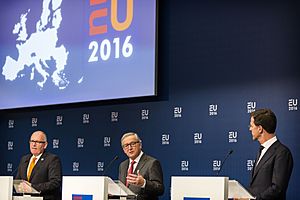
In August 2014, Timmermans called for an independent investigation into events in the Middle East. In a speech, he explained the close ties between Israel and Europe. He believed Europe had a responsibility to maintain good relations with Israel. He also suggested the Netherlands should help ensure Israel's security, but that Israel should also ensure fair rights for Palestinians.
European Commission Roles
Juncker Commission (2014–2019)
In September 2014, the Dutch government nominated Frans Timmermans for the European Commission. On 1 November 2014, he became the First Vice President in Jean-Claude Juncker's Commission. He was a key deputy, working on better rules, relations between EU institutions, the rule of law, and basic rights.
In May 2016, Timmermans praised Turkey's progress on meeting certain agreements for easier travel to the EU.
Timmermans often expressed concerns about changes to Poland's justice system. He stated that new rules could weaken the independence of judges. He also supported sharing the responsibility for people seeking safety within the EU. He believed these individuals deserved refuge from difficult situations.
Candidacy for European Commission President
In October 2018, Frans Timmermans announced he wanted to become the President of the European Commission. He was chosen as the candidate for the Party of European Socialists. He aimed to create a left-leaning group in the European Parliament. His party came in second in the 2019 European election. Although he was initially considered for the presidency, some countries opposed him. In the end, Ursula von der Leyen was chosen as a compromise candidate. Timmermans and another candidate, Margrethe Vestager, became vice-presidents in her commission.
Von der Leyen Commission (2019–2023)
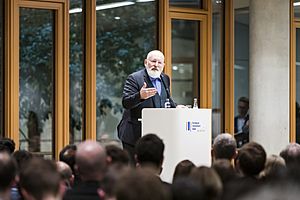
In 2019, President Ursula von der Leyen asked Frans Timmermans to continue as First Vice President. He also became one of three new Executive Vice Presidents. In this role, Timmermans was responsible for the European Green Deal. This important plan aimed to make Europe climate-neutral and included a European Climate Law.
In March 2021, Timmermans confirmed the Commission's commitment to making agricultural policies support the goals of the European Green Deal.
In October 2021, during an energy challenge, Timmermans suggested that the best solution was to rely less on fossil fuels. He noted that a small part of rising energy prices was due to carbon pricing in the EU.
In July 2023, Timmermans led the European delegation for high-level talks with China on environment and climate. Both sides agreed to continue working together to stop climate change, protect biodiversity, and reduce pollution. They also agreed to support a circular economy, which means reusing and recycling resources.
Return to Dutch Politics (since 2023)
In July 2023, a new election was called in the Netherlands. The Labour Party and GroenLinks decided to run together. Timmermans announced he wanted to lead this alliance and become Prime Minister. He received strong support from both parties. On 22 August 2023, he was confirmed as the lead candidate. He resigned from the European Commission on the same day.
The 2023 Dutch general election was held on 22 November 2023. The GL–PvdA alliance finished in second place. Timmermans stated his alliance would not work with parties that blamed people seeking safety for problems. He became the parliamentary leader of GL–PvdA on 6 December. He also helped pass a law in December 2024 to make punishments for hate crimes stronger.
In June 2025, Timmermans was chosen to lead the GL–PvdA list again for the October 2025 elections. After the election results, which showed fewer seats for the alliance, Timmermans announced his resignation as party leader.
Personal Life
Frans Timmermans has been married twice and has four children. He has two children from his first marriage (a daughter born in 1986 and a son born in 1989). He married Irene Timmermans in 2000, and they have a son (born in 2004) and a daughter (born in 2006). After returning from Brussels in 2023, he moved back to his hometown of Maastricht. He is a fan of the Italian football club AS Roma.
Timmermans has spoken about his health challenges. He managed his weight until around 2015, but later found it harder to control. With help from medical specialists, his condition remained manageable. In October 2024, he underwent a medical procedure to help with his health.
In 2021, Time magazine included him in its annual list of the 100 most influential people in the world. Politico Europe also named him one of the 28 most influential people in Europe.
Besides his native Dutch and Limburgish, Timmermans is fluent in English, French, German, Italian, and Russian.
Honours and Decorations
Decorations
- Commander of the Order For Merit (Romania, 2006)
- Officer of the Order of Merit of the Republic of Poland (Poland, 2006)
- Knight of the Legion of Honour (France, 2007)
- Grand Cross of the Order of the Southern Cross (Brazil, 2008)
- 1st Class of the Order of the Cross of Terra Mariana (Estonia, 2008)
- Grand Cross of the Order of the Lithuanian Grand Duke Gediminas (Lithuania, 2008)
- Commander of the Order of the Polar Star (Sweden, 2009)
- Grand Cross of the Order of Merit (Chile, 2009)
- Knight of the Order of Orange-Nassau (Netherlands, 2010)
- Golden Palm Decoration of Honour (Bulgaria, 2018)
Honorary Degrees
- On 16 January 2015, Timmermans received an honorary doctorate from Maastricht University.
- On 11 March 2019, he was awarded an honorary doctorate by National University of Political Studies and Public Administration (SNSPA) in Bucharest, Romania.
- On 10 September 2021, Frans Timmermans received an honorary doctorate by University of Salamanca in Salamanca, Spain.
- On 14 January 2022, Timmermans was awarded an honorary doctorate by Delft University of Technology for his work on climate issues.
See also
 In Spanish: Frans Timmermans para niños
In Spanish: Frans Timmermans para niños


